- Home
- Hanif Kureishi
Love in a Blue Time Page 15
Love in a Blue Time Read online
Page 15
At night he sits in the attic looking through a box of old letters from women. There is an abundance of pastoral description. The women sit in cafés drinking good coffee; they eat peaches on the patio; they look at snow. Everyday sensations are raised to the sublime. He wants to be scornful. It is easy to imagine ‘buzzes’ and ‘charges’ as the sole satisfactions. But what gratifies him? It is as if the gears of his life have become disengaged from the mechanisms that drove him forward. When he looks at what other people yearn for, he can’t grasp why they don’t know it isn’t worth wanting. He asks to be returned to the ordinary with new eyes. He wants to play a child’s game; make a list of what you noticed today, adding desires, regrets and contentments, if any, to the list, so that your life doesn’t pass without your having noticed it. And he requires the extraordinary, on Wednesdays.
He lies on his side in her, their mouths are open, her legs holding him. When necessary they move to maintain the level of warm luxury. He can only gauge her mood by the manner of her love-making. Sometimes she merely grabs him; or she lies down, offering her neck and throat to be kissed.
He opens his eyes to see her watching him. It has been a long time since anyone has looked at him with such attention. His hope is boosted by a new feeling: curiosity. He thinks of taking their sexuality into the world. He wants to watch others looking at her, to have others see them together, as confirmation. There is so much love he almost attempts conversation.
For several weeks he determines to speak during their love-making, each time telling himself that on this occasion the words will come out. ‘We should talk,’ is the sentence he prepares, which becomes abbreviated to ‘Want to talk?’ and even ‘Talk?’
However his not speaking has clearly gladdened this woman. Who else could he cheer up in this way? Won’t clarity wreck their understanding, and don’t they have an alternative vocabulary of caresses? Words come out bent, but who can bend a kiss? If only he didn’t have to imagine continually that he has to take some action, think that something should happen, as if friendships, like trains, have to go somewhere.
He has begun to think that what goes on in this room is his only hope. Having forgotten what he likes about the world, and thinking of existence as drudgery, she reminds him, finger by finger, of the worthwhile. All his life, it seems, he’s been seeking sex. He isn’t certain why, but he must have gathered that it was an important thing to want. And now he has it, it doesn’t seem sufficient. But what does that matter? As long as there is desire there is a pulse; you are alive; to want is to reach beyond yourself, into the world, finger by finger.
Lately
After Chekhov’s story ‘The Duel’
1
At eight, those who’d stayed up all night, and those who’d just risen, would gather on the beach for a swim. It had been a warm spring and was now a blazing, humid summer, the hottest of recent times, it was said. The sea was deliriously tepid.
When Rocco, a thin dark-haired man of about thirty, strolled down to the sea in his carpet slippers and cut-off Levi’s, he met several people he knew, including Bodger, a local GP who struck most people, at first, as being unpleasant.
Stout, with a large close-cropped head, big nose, no neck and a loud voice, Bodger didn’t appear to be an advertisement for medicine. But after they had met him, people began to think of his face as kind and amiable, even charming. He would greet everyone and discuss their medical and even psychological complaints in the pub or on the street. It was said that people took him their symptoms to give him the pleasure of attempting to cure them. The barbecues he held, at unusual and splendid locations, were famous. But he was ashamed of his own kindness, since it led him into difficulties. He liked to be curt.
‘I’ve got a question for you,’ said Rocco, as they made their way across the mud flats. ‘Suppose you fell in love. You lived with the woman for a couple of years and then – as happens – stopped loving her, and felt your curiosity was exhausted. What would you do?’
‘Get out, I’d say, and move on.’
‘Suppose she was on her own and had nowhere to go, and had no job or money?’
‘I’d give her the money.’
‘You’ve got it, have you?’
‘Sorry?’
‘Remember, this is an intelligent woman we’re talking about.’
‘Which intelligent woman?’ Bodger enquired, although he had already guessed.
Bodger swam vigorously according to his routine; Rocco stood in the waves and then floated on his back.
They dressed at the base of the cliffs, Bodger shaking sand from his shoes. Rocco picked up the papers he’d brought with him, an old copy of the New York Review of Books and the Racing Post.
‘It’s a nightmare living with someone you don’t love, but I wouldn’t worry about it,’ advised the doctor, in his ‘minor ailments’ voice. ‘Suppose you move on to another woman and find she’s the same? Then you’ll feel worse.’
They went to a vegetarian café nearby, where they were regulars. The owner always brought Bodger his own mug and a glass of iced water. Bodger enjoyed his toast, honey and coffee. The swimming gave him an appetite.
Unfortunately, Rocco craved almond croissants, which he’d once had in a café in London; every morning he’d raise his hand and ask the manager to bring him some. Of course, in their town they’d never seen such things, and each request annoyed the manager more. Bodger could see that one day Rocco would get a kick up his arse. He wished he had the nerve to make such enjoyable trouble.
‘I love this view.’ Bodger craned to look past Rocco at the sea. Rocco was rubbing his eyes. ‘Didn’t you sleep?’
‘I must tell someone. Things with Lisa are bad.’ Rocco ignored the fact that Bodger was drumming his fingers on his unopened newspaper. ‘I’ve lived with her two years. I loved her more than my life. And now I don’t. Maybe I never loved her. Maybe I was deluded. Perhaps I am deluded about everything. How can people lead sensible lives while others are a mess? You know what Kierkegaard said? Our lives can only be lived forward and only understood backwards. Living a life and understanding it occupy different dimensions. Experience overwhelms before it can be processed.’
‘Kierkegaard! I’ve been intending to read him. Is he great?’
‘Perhaps I enjoyed stealing her from her husband. What?’
‘Which book of his should I start with?’
Rocco said, ‘She was always up for sex, and I was always hard. We fucked so often we practically made electricity.’
Bodger leaned forward. ‘What was that like?’
‘We wanted to leave London. The people. The pollution. The expense. We came here … to get a bit of land, grow stuff, you know.’
‘The dope?’
‘Don’t be fatuous. Vegetables. Except we haven’t got them in yet.’
‘It’s a little late.’
‘Maybe you or your friend Vance would have started a business and a family and all that. But this town is getting me down. And Lisa is always … always … about the place. That’s what I’m saying.’
‘I wouldn’t leave a beautiful woman like that.’
‘Even if you didn’t love her?’
‘Not her. Romance doesn’t last. But respect and co-operation do. I’m a doctor. I recommend endurance.’
‘If I wanted to test my endurance I’d go to the gym like that idiot Vance. I think I’ve got Alzheimer’s disease.’
The doctor laid his hand on Rocco’s forehead. It was damp. Rocco seemed to be sweating alcohol. Bodger was about to inform him that his T-shirt was inside out and back to front, but he remembered that when his friend’s shirts became too offensive he reversed them.
‘I don’t think so. Does she love you?’
Rocco sighed. ‘She thinks she’s one of those magazine independent women, but without me she’d be all over the place. She’s useless really. What can she do? She has irritating ways.’
‘Like what?’ said Bodger with interest.
&nbs
p; Rocco tried to think of a specific illustration that wasn’t petty. He couldn’t tell Bodger he hated the way she poked him in the stomach while trying to talk to him; or the way she blew in his nostrils and ears when they were having sex; or the way she applied for jobs she’d never get, and then claimed he didn’t encourage her; how she always had a cold and insisted, when taking her temperature, that insertion of the thermometer up the backside was the only way to obtain a legitimate reading; or how she was always losing money, keys, letters, even her shoes, and falling off her bicycle. Or how she’d take up French or singing, but give up after a few weeks, and then say she was useless.
Rocco said, ‘What can you do when you’re with a person you dislike, but move on to another person you dislike? Isn’t that called hope? I’m off.’
‘Where?’
‘Back to London. New people, new everything. Except we’ve got no money, nothing.’
Bodger said, ‘You’re intelligent, that’s the problem.’
Rocco was biting his nails. ‘I miss the smell of the tube, the crowds in Soho at night, men mending the road outside your window at eight in the morning, people pissing into your basement, repulsive homunculi in ill-fitting trousers shouting at strangers. In the city anything can turn up. There’s less time to think there. My mind won’t shut up, Bodger.’
The doctor collected his things. ‘Nor will my patients.’
‘Don’t mention this, because I’m not telling her yet.’ Rocco pulled out a letter. ‘Yesterday this arrived. It fell open – accidentally. Her husband’s not well.’
Bodger leant over to look at it, but stopped himself. ‘What’s wrong with him?’
‘He’s dead.’
‘Aren’t you going to show it to her?’
‘She’ll get upset and I won’t be able to leave her for ages.’
‘But you took her away from her husband, for God’s sake. Marry her now, Rocco, please!’
‘That’s a good idea, when I can’t bear the girl and couldn’t fuck her with my eyes closed.’
Bodger paid, as he always did, and the two friends walked along the top of the cliff. When they parted Bodger told Rocco how he wished he had a woman like Lisa, and that he didn’t understand why she would live with Rocco and not with him.
‘Those shoulders, those shoulders,’ he murmured. ‘I’d be able to love her.’
‘But we’ll never know that for sure, will we?’ said Rocco. ‘Thanks for the advice. By the way, have you ever lived with a woman?’
‘What? Not exactly.’
Rocco sauntered off.
Bodger hoped he wouldn’t be thinking of Rocco and Lisa all morning. Occasions like this made him want to appreciate what he had. He would do this by thinking of something worse, like being stuck in a tunnel on the District Line in London on the hottest day of the year. Yes, he liked this seaside town and the sea breeze, particularly early in the morning, when the shops and restaurants were opening and the beach was being cleaned.
‘Karen, Karen!’ he called to Vance’s wife who was jogging on the beach. She waved back.
2
When Rocco got home Lisa had managed to dress and had even combed her hair. She wore a long black sleeveless dress and knee-high leather boots. The night before she’d been at a party on the beach. Most people had been stoned. She couldn’t see the point of that any more, everyone out of it, dancing in their own space. She had got away and rested in the dunes. Now she sat at the window drinking coffee and reading a magazine she’d read before.
‘Would it be okay if I went swimming this morning?’ she asked.
She was supposed to sign on but had obviously forgotten. Rocco was about to remind her but preferred the option of blaming her later.
‘I don’t care what you do.’
‘I only asked because Bodger told me to take it easy.’
‘Why, what’s wrong with you now?’
She shrugged. He looked at her bare white neck and the little curls on the nape he had kissed a hundred times.
He went into the bedroom. His head felt damp, as if sweat was constantly seeping from his follicles. He was too exhausted to even gesture at the ants on the pillow. They were all over the house. If you sat down they crawled up your legs; if you opened a paper they ran across the pages. But neither of them did anything about it.
He lay down. Almost immediately, though, he groaned. He could hear, through a megaphone, a voice intoning Hail Marys. The daily procession of pilgrims to the local shrine, one of Europe’s oldest, had begun. They came by coach from all over the country. People in wheelchairs, others on crutches, the simple, the unhappy and the dying limped up the lane past the cottage. A wooden black madonna was hoisted on the shoulders of the relatively hearty; others embraced rosaries and crucifixes. The sound echoed across the fields of grazing cattle. Cults, shamen, mystics; the hopeless searched everywhere. To everyone their own religion, these days. Who was not deranged, from a certain point of view? Who didn’t long for help?
In their first weeks in the cottage, he and Lisa had played a game as the pilgrims passed. Rocco would put on a Madonna record, run up the steps of their raised garden, and piss over the hedge onto the shriners, crying, ‘Holy water, holy water!’ Lisa would rush to restrain him and they would fuck, laughing, in the garden.
The day was ahead of him and what did he want to do? He thought that having intentions, something in the future to move towards, might make the present a tolerable bridge. But he couldn’t think of any projects to want.
Rereading the letter he looked up and saw Lisa observing him. He was about to stuff it back in his pocket, but how would she know what it contained?
Three years ago he had fallen in love. Lisa wasn’t only pretty; plenty of women were pretty. She was graceful, and everything about her had beauty in it. She was self-aware without any vanity; and, most of the time, she knew her worth, without conceit. With her, he would make an attempt at monogamy, much vaunted as a virtue, apparently, by some. She would curb his desire. Running away with her would also represent an escape from futility. Now, however, he felt that all he had to do was abandon her, flee and somehow achieve the same thing.
He said, ‘I’ll ask Bodger if you can swim. I need some advice myself.’
‘About what?’
‘Everything.’
Rocco knew he was talented: he could play and compose music; he could direct in the theatre and on film; he could write. To release his powers he had to get away. Action was possible. That, at least, he’d decided. This cheered him, but not as much as it should, because he didn’t even have the money to travel to the next railway station. And, of course, before he got out he’d have to settle things with Lisa. He needed a longer discussion with Bodger.
At twelve they had lunch because there was nothing else to do. He and Lisa always had the same thing, tinned tomato soup with cheese on toast, followed by jelly with condensed milk. It was cheap and they couldn’t argue about what to have.
‘I love this soup,’ he said, and she smiled at him. ‘It’s delicious.’ It was too much, being nice. He didn’t think he could keep it up. Not even the thought of her dead husband brought on compassion. ‘How do you feel today? Or have I asked you that already?’
She shook her head. ‘Stomach pains again, but okay.’
‘Take it easy then.’
‘I think so.’
The sound of her slurping her jelly, which he hoped that just this once she would spare him, made him see how husbands murdered their wives. He pushed away his bowl and ran out of the cottage. She watched him go, the spoon at her lips.
3
‘Scum. Rocco is scum,’ said Vance. ‘He really is. And I can tell you why.’
‘You had better,’ said Bodger.
Bodger was studying Feather, the local therapist who lived nearby, because he was drawing her.
Vance was glancing at himself in Bodger’s mirror, not so much to admire his crawling sideburns, floral shirt, ever-developing shoulders, and
thick neck, but to reassure himself that his last, satisfying impression had been the correct one.
He ran the town’s hamburger restaurant, a big place with wooden floors, loud seventies music and, on the walls, rock posters and a T-Rex gold disc. In the basement he had recently opened the Advance, a club. Nearby he owned a clothes shop.
Vance was the most ambitious man in the town. It was no secret that his appetite extended further than anything or anyone in front of him. Looking over their heads, he was going places. But it was here, to his perpetual pique, that he was starting from.
Like numerous others, he often dropped by Bodger’s place in the afternoon or late at night, to gossip. Most surfaces in Bodger’s house were covered with bits of wood that he’d picked up on walks, or with his drawings or notebooks. There were towers of annotated paperbacks on astronomy, animals, plants, psychology; collapsing rows of records; and pieces of twisted metal he’d discovered in skips. The chairs were broken, but had a shape he liked; his washing, which he did by hand as ‘therapy’, hung in rows across the kitchen. To Vance it was detritus, but every object was chosen and cherished.
Vance said, ‘Did you know what he said about this shirt? He asked if I were wearing the Nigerian or the Ghanaian flag.’
Feather started to laugh.
‘Yes, it’s hilarious,’ said Vance. ‘He provokes me and then wants my respect.’
Bodger said, ‘I saw him this morning and felt sorry for him.’
‘He’s rubbish.’
‘Why say that of someone?’
Vance said, ‘Did you know – he’s probably told you several times – that he’s got two degrees in philosophy? He’s had one of the best educations in the world. And who paid for it? Working people like me, or my father. And what does he do now? He drinks, hangs around, borrows money, and sells dope that gives people nightmares. Surely we should benefit from his brilliant education? Or was it just for him?’

 Intimacy
Intimacy Love + Hate: Stories and Essays
Love + Hate: Stories and Essays Love in a Blue Time
Love in a Blue Time Something to Tell You
Something to Tell You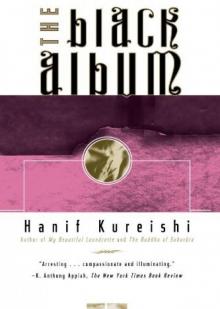 The Black Album
The Black Album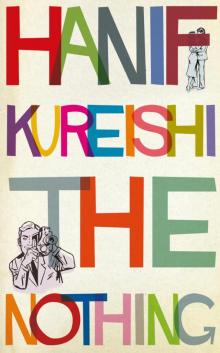 The Nothing
The Nothing Gabriel's Gift
Gabriel's Gift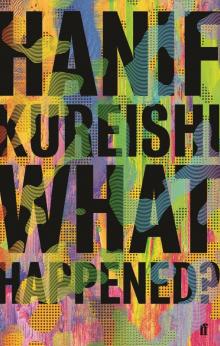 What Happened?
What Happened? Midnight All Day
Midnight All Day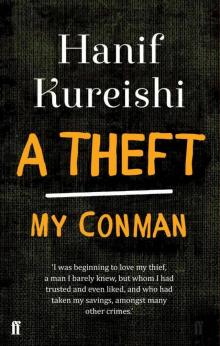 A Theft: My Con Man
A Theft: My Con Man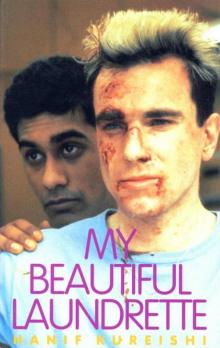 My Beautiful Launderette
My Beautiful Launderette Love + Hate
Love + Hate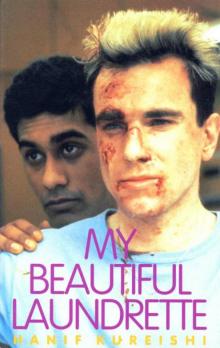 My Beautiful Laundrette
My Beautiful Laundrette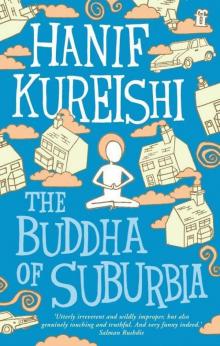 The Buddha of Suburbia
The Buddha of Suburbia